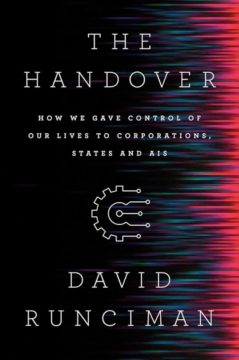Blake Smith at Literary Review:
 We do not typically think in our everyday interactions with them of states and corporations as vast, powerful, long-lived, non-human ‘intelligences’. But, as Runciman rightly reminds us, the premier theorist of the modern state, Thomas Hobbes, explicitly conceived of it in such terms. A long intellectual tradition, likewise, has emphasised that states and corporations, organised alike through bureaucratic forms that restrict the personal spontaneity of their human components via techniques of abstraction and routinisation, possess peculiar modes of ‘thinking’ that are not quite comparable to the way individual people think. Theorists like Emile Durkheim, Max Weber and Michel Foucault registered, with different degrees of admiration and horror, their recognition that the modern era had witnessed the almost total subsuming of human life, at least in the developed world, into forms imposed on it by these artificial intelligences.
We do not typically think in our everyday interactions with them of states and corporations as vast, powerful, long-lived, non-human ‘intelligences’. But, as Runciman rightly reminds us, the premier theorist of the modern state, Thomas Hobbes, explicitly conceived of it in such terms. A long intellectual tradition, likewise, has emphasised that states and corporations, organised alike through bureaucratic forms that restrict the personal spontaneity of their human components via techniques of abstraction and routinisation, possess peculiar modes of ‘thinking’ that are not quite comparable to the way individual people think. Theorists like Emile Durkheim, Max Weber and Michel Foucault registered, with different degrees of admiration and horror, their recognition that the modern era had witnessed the almost total subsuming of human life, at least in the developed world, into forms imposed on it by these artificial intelligences.
Today’s well-justified fears about AI, Runciman cogently argues, should not blind us to the many ways in which humanity has already transformed itself over the past few centuries, outsourcing much of its decision-making to large, opaque, impersonal entities that dominate our political, economic and indeed personal lives.
more here.
